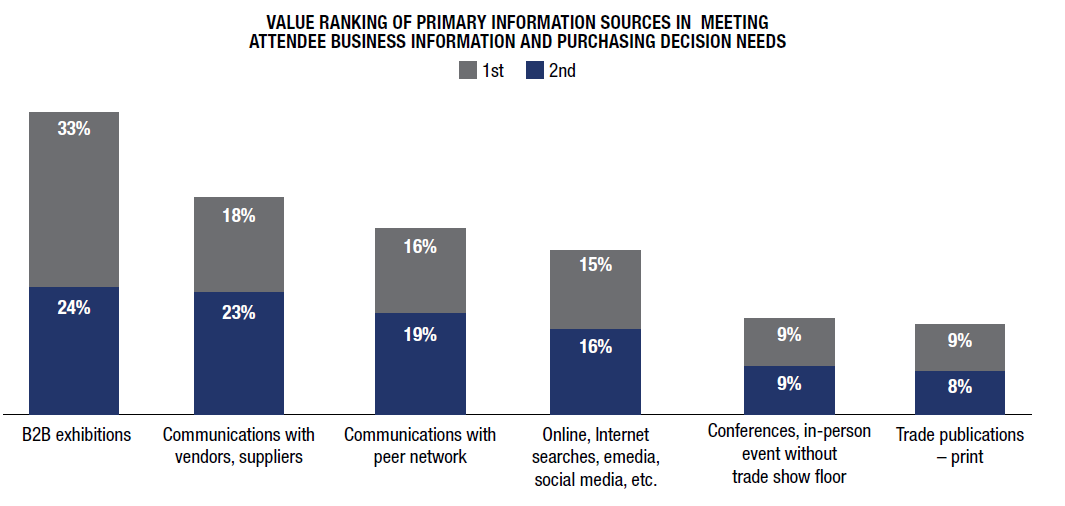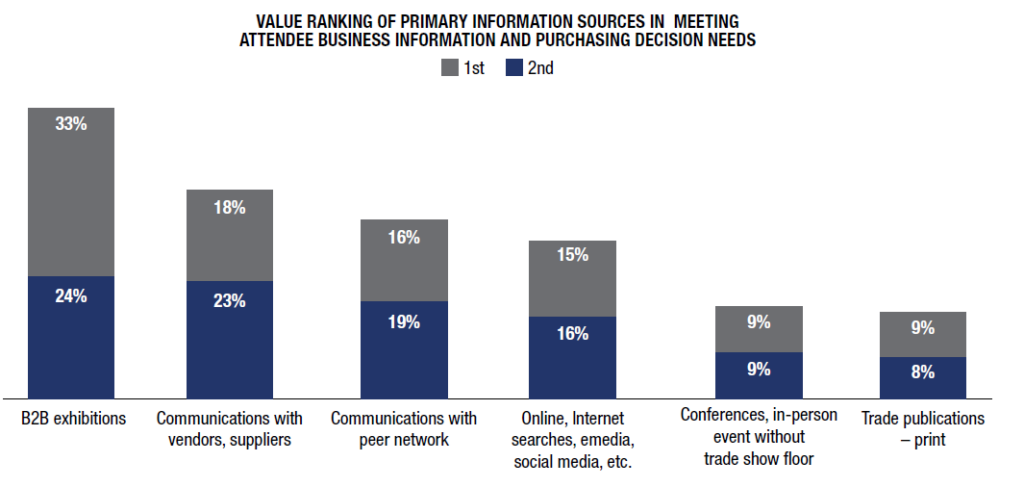By Nancy Drapeau, PRC, Vice President of Research, CEIR
Access to information has never been easier. Keying a few words into Google search generates a mountain of information. Activating a real-time, online chat with a company contact is easy too. Despite all this, why is it that professionals that attend B2B exhibitions or trade shows rank the value of B2B exhibitions as number one, compared to other primary information sources used? Information from the Internet does not come close. Despite that B2B exhibitions are temporary meeting places that last at most a few days, when done well, the impact is profound and unbeatable compared to resources likely relied upon more frequently.

What sustains the dominance of this channel? I think first and foremost, it boils down to a simple fact: people crave physical experiences. Though digital provides abundant information, the need for the real thing persists. There is a base-level need to connect with each other, with peers, with others in their professional communities, with one’s tribe. And when shopping, there is a need to touch and feel products to be purchased. For service purchases, gaining trust and confidence in the vendor is an important consideration.
At a lecture held at Expo! Expo! 2018, Janet Sperstad, CMP, Program Director at Madison Area Technical College’s Meeting and Event Management Degree and a neuroscientist explains that trust, when defined chemically, is oxytocin. She further explains that, “Handshakes, fist bumps, hugs, high fives, family and friends all generate a 45 percent boost in oxytocin.” All this creates memorable, positive experiences. A Fastcompany article is worth a read on this phenomenon. This article also notes the effectiveness of feeling affiliation with another. That by itself boosts the openness to trust. Chances to shake hands with exhibitors, peers, industry experts and other engagement opportunities at these events generate opportunities for building trust. A study published in 2008 by the Advertising Research Foundation, based on research conducted in partnership with Gallup and Robinson, Harris Interactive and Exhibit Surveys, documents how engagement in an exhibit booth generates a positive boost in KPIs (key performance indicators) tracked by brand marketers. The higher the engagement, the greater the effect on boosting brand awareness, increasing NPS (net promoter score) and most importantly, intent-to-purchase. Again, physical engagement has a biological effect which ultimately drives desired outcomes for exhibiting.

These facts are just baseline observations. In today’s political and social environments where uncertainty is high and trust in public institutions seems to be crumbling, the role of B2B exhibitions in serving this base level need is more crucial than ever. It is an opportunity to help professionals and their organizations survive and thrive in these uncertain times. The Attendee ROI Playbook series results suggest they are looking to the events they attend for this. It is an oasis, a safe haven, to help understand how to navigate and move forward successfully.
A few events that have chipped away at public confidence in institutions:
- Facebook’s sharing of personal information with Cambridge Analytica, which harvested a multitude of datapoints about individuals enabling highly sophisticated micromarketing on a level not seen before. This data was used by the Trump campaign.
- Alleged Russian interference the U.S. Presidential elections, including unencumbered purchase of advertising on Facebook. The Mueller investigation dribbles on, with no an end point in sight. And the hearings for the candidate for the U.S. Attorney General, William Barr, casts uncertainty as to whether the conclusions of the Mueller investigation will be shared with Congress and the public.
- The age of the Twitter President, bypassing traditional communication outlets and making tweets with policy implications is historic. Tweets are done daily or more frequently, throwing government and media into tumult. The start of a trade war with China, a precipitous shutdown of the government and other actions generate more uncertainty in the marketplace.
- Brexit victory in the United Kingdom, with this country still reeling from the vote and unable to come to terms with what it means for that country.
Entities tracking trust in institutions over multiple years uncover profound shifts. Pew Research documents decline in trust in the government and social media outlets. Gallup polling results on trust in government registers a similar decline. Edelman tracks declining trust in institutions. At Expo! Expo! 2018, Dina Cappiello, SVP and Editorial Director at Edelman shared results from Edelman’s Trust Barometer with informed adults. She noted results suggested that the informed public is expecting brands to lead the way in these trust-challenged times given their higher trust scores over public institutions.
Given that B2B exhibitions are a convening of brands of relevance to target audiences, that is, exhibitors on an exhibition floor, this result points to a critical opportunity for organizers to facilitate the F2F engagement attendees are craving with the brands they look up to. As well, the event itself, as a recognized brand, has the trust of attendees. It is an opportunity for events to lead and guide their communities in this era of uncertainty.
Nancy Drapeau, PRC, is Vice President of Research of CEIR. Opinions are her own. You can reach her at ndrapeau@ceir.org.
